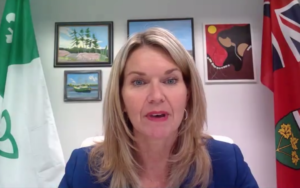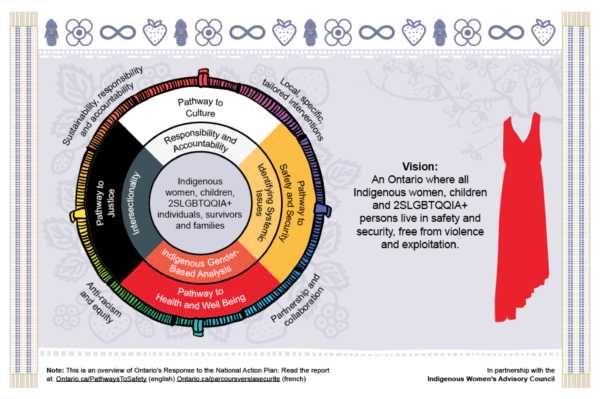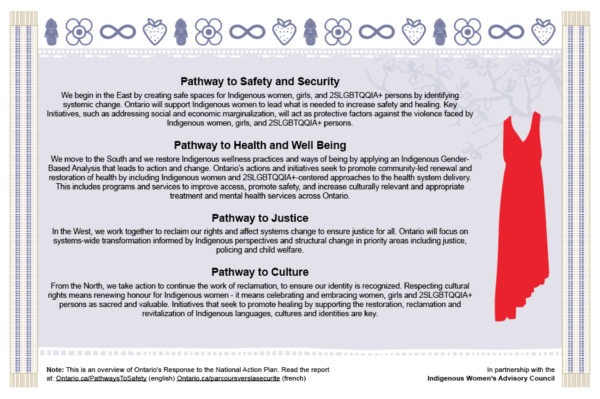A virtual ceremony was held yesterday with Jill Dunlop (Associate Minister of Children and Women’s Issues), the Indigenous Women’s Advisory Council, and other Indigenous leaders, communities, and organizations to unveil the Ontario government’s strategy that addresses the disproportionate rate of violence against Indigenous women and girls.
By working with Indigenous partners this plan addresses critical gaps in supports for Indigenous women, children, and Two-Spirit, Lesbian, Gay, Bisexual, Transgender, Queer, Questioning, Intersex, Asexual, plus (2SLGBTQQIA+) people, including the need for better access to stable housing, health care, education, and employment.
The virtual ceremony was chaired by Michelle Sault, and began with a prayer by Grandmother Holly. Her eloquent prayer asked for comfort, support and guidance from Creator for all who have experienced violence and loss, and help all to find peace. A honour song for all the women and women to come was sung by Audrey DeRoy from the shores of Lake Superior.
 From Toronto, Jill Dunlop explained that Minister Rickford was unable to attend. She acknowledged the land, and began her presentation, stating that two years ago the MMIW & G report was released. This report had 231 calls for justice. Ontario knew that it had to “respond to these calls for justice as effectively and quickly as possible to ensure that future generations of indigenous women, children, and 2SLGBTQQIA+ people can live safely and heal from trauma. It also became clear that any efforts to address the root causes of violence cannot succeed unless they are led by Indigenous people, particularly Indigenous women.” She continued explaining that a committee was formed, “Last year the Indigenous Women’s Advisory Council was founded; co-chaired by Cora McGuire-Cyrette, ONWA, and Sandra Montour of Six Nations of the Grand River.” This organization shared time, knowledge and expertise to guide the Ontario government and this response.
From Toronto, Jill Dunlop explained that Minister Rickford was unable to attend. She acknowledged the land, and began her presentation, stating that two years ago the MMIW & G report was released. This report had 231 calls for justice. Ontario knew that it had to “respond to these calls for justice as effectively and quickly as possible to ensure that future generations of indigenous women, children, and 2SLGBTQQIA+ people can live safely and heal from trauma. It also became clear that any efforts to address the root causes of violence cannot succeed unless they are led by Indigenous people, particularly Indigenous women.” She continued explaining that a committee was formed, “Last year the Indigenous Women’s Advisory Council was founded; co-chaired by Cora McGuire-Cyrette, ONWA, and Sandra Montour of Six Nations of the Grand River.” This organization shared time, knowledge and expertise to guide the Ontario government and this response.
“The tragedy of violence towards Indigenous people is completely unacceptable and must be met with real solutions to uproot the causes,” said Minister Dunlop. “We listened carefully to the survivors, families and loved ones who participated in the National Inquiry. We also collaborated closely with Indigenous partners, including members of the Indigenous Women’s Advisory Council, to ensure their voices guided Ontario’s action plan on the critical issues impacting their communities. I am proud of where we have come but know there is much more work to be done to ensure all Indigenous people can live in safety, free from violence.”
The Indigenous Women’s Advisory Council defined priorities and helped to develop a framework, incorporating 118 initiatives into each of the six areas for action:
- Pathway to Safety & Security – Initiatives that promote safety, healing and wellness through prevention-focused resources, investments and programs, such as access to safe and affordable housing.
- Pathway to Culture – initiatives supporting the education, training, employment and revitalization of Indigenous languages, cultures and identities.
- Pathway to Health – initiatives that will promote safety and improve access to services including mental health supports for Indigenous women, children and justice-involved youth.
- Pathway to Justice – initiatives that will contribute to system-wide transformation in priority sectors including policing services and child welfare.
- Pathway to Responsibility and Accountability – principles that will be upheld to promote ongoing government accountability in collaboration with the Indigenous Women’s Advisory Council and Indigenous organizations.
- Pathway to Identifying and Addressing Systemic Anti-Indigenous Racism and Indigenous Gender-based Analysis – initiatives that focus on addressing anti-Indigenous racism and developing an Indigenous gender-based analysis approach to inform Ontario’s strategy.
As part of Ontario’s strategy, the mandate of the Indigenous Women’s Advisory Council has been extended beyond March 2022. This will ensure that Indigenous voices continue to drive the strategy’s priorities and help build on the province’s progress to date in responding to violence against Indigenous women, children and 2SLGBTQQIA+ people.
“In honouring the voices of Indigenous women, we have worked collectively to ensure that Ontario’s response placed their safety and healing as foundational priorities for generations to come,” said Cora McGuire-Cyrette, Indigenous Women’s Advisory Council Co-Chair. “This is just the beginning as we need to now deconstruct the systems that contribute to this crisis and reconstruct Indigenous women’s leadership and Indigenous women’s safety to make an impact across generations.”
“It’s been such a long painful journey, and while we are not done yet, at least we are now being heard,” said Sandra Montour, Indigenous Women’s Advisory Council Co-Chair. “Through this strategy, may the voices of our missing and murdered and their families be forever heard to promote the safety and well-being of Indigenous women, girls and 2SLGBTQQIA+ families for seven generations to come.”
Further information about the pathways and actions can be found at this link.
- Hwy 17 (Wawa to Batchawana Bay) OPEN - February 11, 2026
- Tuesday Morning News – February 10 - February 10, 2026
- Monday Morning News – February 9 - February 9, 2026
 Wawa-news.com Local and Regional News
Wawa-news.com Local and Regional News

